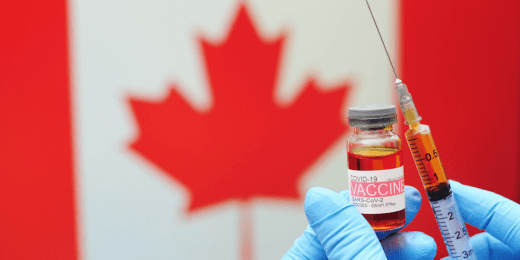National Immunization Awareness Week Canada: A Guide
Learn what National Immunization Awareness Week Canada is, why it’s important, and how your organization can participate in the campaign.

Published 11 Apr 2025
Article by
4 min read
What is National Immunization Awareness Week Canada?
In Canada, National Immunization Awareness Week (NIAW) is an annual event held during the last week of April to emphasize the importance of immunization in safeguarding public health. In 2025, NIAW is scheduled from April 21 to 30, aligning with Vaccination Week in the Americas and World Immunization Week.
Importance
National Immunization Awareness Week is celebrated in Canada alongside World Immunization Week to remind everyone about the importance of immunization. This week is important because it reminds Canadians that vaccines are a safe and effective way to prevent serious illnesses and protect public health. The campaign helps combat misinformation by promoting accurate, science-based information about immunization. It also encourages individuals of all ages to stay up to date with their vaccinations, reducing the risk of disease outbreaks in communities.
Every year, there is a set theme for the week to bring attention to different current issues experienced by many Canadians today. This 2025, the theme, “Don’t let history repeat itself. Protect your future. Get immunized,” underscores the critical role of vaccines in preventing the resurgence of diseases like polio, tetanus, diphtheria, and meningitis.
How to Observe National Immunization Awareness Week in Canada
Participation in National Immunization Awareness Week Canada is not mandatory, and companies are free to observe or participate in the campaign however they want. That said,Immunize Canada is in charge of the initiative and suggests that organizations in Canada participate in the campaign. Here are some of the ways they can do so:
Educational Initiatives
Businesses can participate by offering informational resources to employees about the importance of immunization and how vaccines help prevent the spread of diseases. This could involve sharing digital training courses, hosting webinars with healthcare experts, or organizing discussions on vaccination. By educating staff, businesses foster a healthier workplace and reduce vaccine-related misinformation.
Implement Vaccination Programs
Businesses can set up on-site vaccination clinics or partner with local healthcare providers to offer convenient access to vaccines for employees. This initiative makes it easier for workers to get vaccinated without taking time off, promoting overall health and safety within the company. By implementing vaccination programs, businesses contribute to both individual and community health.
Community Engagement
Businesses can engage with local organizations, schools, or community centers to promote National Immunization Awareness Week through sponsorships, volunteer activities, or information-sharing events. This collaboration strengthens community ties, improves organizational trust and reputation, and shows the business’s commitment to public health. By actively participating, businesses help amplify the message of vaccination, creating a greater collective impact.
Another way businesses can be involved in community engagement is by contributing to safer and more efficient cold chain management for vaccine transport and storage with their own resources, such as donations,fleets, and manpower. This can be done as part of the organization’s Corporate Social Responsibility (CSR) efforts.
Achieve operational excellence
Cultivate a culture of excellence with our digital solutions that enhance efficiency, agility, and continuous improvement across all operations.
Enhance National Immunization Awareness Week Participation with Technology
Recent technological advancements can make observing National Immunization Awareness Week much easier and more efficient. Some ways businesses can use technology for raising awareness for this event include the following:
Digital Checklists – There are various digital checklists for businesses and organizations to track and ensure that employees or community members are up-to-date on their immunizations. These checklists can be customized for specific vaccination schedules, making it easier to monitor and follow up on needed vaccines.
Internet-of-Things ( IoT) Sensors – IoT sensors can monitor the temperature and conditions of vaccine storage and store them in the cloud , ensuring they are kept within the required parameters for safety and efficacy. This technology can send real-time alerts to prevent any loss of vaccine potency due to improper storage conditions.
Digital Training –
Celebrate National Immunization Awareness Week Canada with SafetyCulture
Why Use SafetyCulture?
SafetyCulture is a mobile-first operations platform adopted across industries such as manufacturing, mining, construction, retail, and hospitality. It’s designed to equip leaders and working teams with the knowledge and tools to do their best work—to the safest and highest standard.
Manage educational initiatives, host vaccine drives, and engage with the community with the digital platform. With various tools to improve workflows and efficiency, participating in vaccination campaigns is much easier.
✓ Save time and reduce costs ✓ Stay on top of risks and incidents ✓ Boost productivity and efficiency ✓ Enhance communication and collaboration ✓ Discover improvement opportunities ✓ Make data-driven business decisions
Related articles
Health
Medical Assessment

Achieving Zero Blood Culture Contamination
Learn what blood culture contamination is, why it occurs, and proven strategies to prevent false-positive results.
Health
Medical Assessment

A Guide to Celebrating Medical Laboratory Professionals Week
Find out what Medical Laboratory Professionals week is, its history, and different ways companies can celebrate it.
Health
Medical Assessment

A Guide to Efficient Veterinary Practice Management
Learn what veterinary practice management is, why it’s important, and its key aspects.